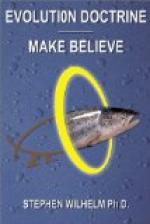Although the doctrine of evolution was stated in very nearly its present form more than a century ago, much misunderstanding still exists as to its exact meaning and nature and value; and it is one of the primary objects of these discussions to do away with certain current errors of judgment about it. It is often supposed to be a remote and recondite subject, intelligible only to the technical expert in knowledge, and apart from the everyday world of life. It is more often conceived as a metaphysical and philosophical system, something antagonistic to the deep-rooted religious instincts and the theological beliefs of mankind. Truly all the facts of knowledge are the materials of science, but science is not metaphysics or philosophy or belief, even though the student who employs scientific method is inevitably brought to consider problems belonging to these diverse fields of thought. A study of nervous mechanism and organic structure leads to the philosophical problem of the freedom of the will; questions as to the evolution of mind and the way mind and matter are related force the investigator to consider the problem of immortality. But these and similar subjects in the field of extra-science are beyond its sphere for the very good reason that scientific method, which we are to define shortly, cannot be employed for their solution. Evolution is a science; it is a description of nature’s order, and its materials are facts only. In method and content it is the very science of sciences, describing all and holding true throughout each one.
The overwhelming importance of knowing about natural laws and universal principles is not often realized. What have we to do with evolution and science? Are we not too busy with the ordering of our immediate affairs to concern ourselves with such remote matters? So it may appear to many, who think that the study of life and its origin, and of the vital facts about plants and animals may be interesting and may possess a certain intellectual value, but nothing more. The investigation of man and of men and of human life is regarded by the majority as a mere cultural exercise which has no further result than the recording of present facts and past histories; but it is far otherwise. Science and evolution must deal with mere details about the world at large, and with human ideals and with life and conduct; and while their purpose is to describe how nature works now and how it has progressed in the past, their fullest value is realized in the sure guidance they provide for our lives. This cannot be clear until we reach the later portions of our subject, but even at the outset we must recognize that knowledge of the great rules of nature’s game, in which we must play our parts, is the most valuable intellectual possession we can obtain. If man and his place in nature, his mind and social obligations, become intelligible, if right and wrong, good and evil, and duty come to have more definite and assignable values through an understanding of the results of science, then life may be fuller and richer, better and more effective, in direct proportion to this understanding of the harmony of the universe.




